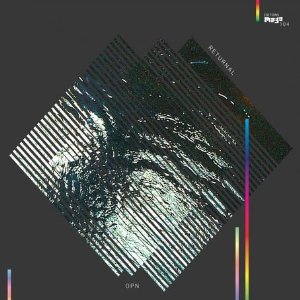For a good few decades, in fact probably since the dawn of sensible-shoed original gangsters like Steve Reich and Iannis Xenakis, there has existed this strange contradiction in the realm of ‘noise music’. A lot of those who create unlovely piercing sonic ear testers also have a yen for lush, yielding beatless sound worlds which are not hard to listen to at all, but in fact are very soothing and a bit like (often, at this point, influenced by) 70s and 80s new age music. New York-based Daniel Lopatin is a very good example of this schism. He records under a few names, but normally as Oneohtrix Point Never (the name is supposed to sound like an imaginary radio frequency) and, as is customary for artists in cassette/CD-R culture, fires out product with the frequency of a tennis ball launcher. Sometimes he reduces the listener to womb-y bliss, other times he sees fit to unscrew an air vent and dust everything with aural silt. Returnal is his first album for the Austrian label Editions Mego, where he joins artists like Florian Hecker, Fennesz and Emeralds, who enjoy a similar standing to Lopatin in the American crypto-kosmische underbelly of now.
Two thousand and ten, then, and Lopatin is hovering in that hazy zone where an artist is still a fair distance away from getting bank off his releases, and not actually selling that many units, but is nonetheless pretty much at the top of the tree as regards this peculiar li’l musical niche. Folks who don’t tend to listen to stuff like this, but have read up on it a bit and feel like it’s something they should dip a toe in, are as likely as not to choose Oneohtrix Point Never as their entry point. In the grand spirit of overthinking and/or second-guessing the intentions of artists who you’ve never met, I like to imagine that ‘Nil Admirari’, the first track on Returnal, was conceived and judiciously placed with the intention of cookin’ up these sorts’ brains. Like all his tracks, it’s constructed wholly from vintage synthesizers (nothing too crazy – a Juno-60 and an Electribe ES-1, i.e. names that even knobbers like me who don’t play music recognise), and “recorded using a personal computer” (his non-specific wording), but unlike most of his tracks, it’s bananas, and also sort of hurtful: sliced-up aural detritus with no enduring rhythm or melody, sounding kind of like American noise veterans The Haters and, yeah, serving to let you know that this isn’t your uncle Neville’s whale music tapes that he had in 1985 in a room with a Body Shop "then you will realize money cannot be eaten" poster. You remember.
Just as it gets to its fifth minute of pummeling, a singular gleaming drone takes charge, and it segues into track two, ‘Describing Bodies’, which conveys a remarkable degree of emotional weight by simply sustaining this drone for four and a bit minutes. ‘Stress Waves’ operates with roughly the same level of repetition, a bassy throb pushpulling you towards the light, and again you’re sucked in without realizing. So Returnal has moved from all-out noize to flat-track space hum to the merest hint of rhythm – the title track is a logical next step, in that it utilises Lopatin’s vocals, very rare in the OPN canon. They’re vocodered and layered to the point of incomprehensibility, but folded into the blissful, cyclical chords that underpin ‘Returnal’, they work a charm. (Fans of artificial genres might also like to note that this song is OPN’s clearest qualification to be ‘hypnagogic pop’, at least if I correctly understand the intentions of the genre’s inventor, David Keenan, beyond low-level trolling.)
In my late teens, I went to quite a few dance festivals of the soapless persuasion, which inevitably involved psytrance and digidub and wandering around at dawn looking for something to do. Oftentimes, this something would come in the form of a skanky marquee playing ‘chillout music’. It was always shit, and made worse by the fact that I was crushing on Kranky Records type biz at the time – Labradford, Roy Montgomery, Magnog and what have you – and would end up sitting there thinking how infinitely more suitable their music would be to the sub-Ozrics noseflute cockery that inevitably got played. Why am I telling you this? Well, the second half of Returnal has revived these mildly mangled memories, by virtue of sounding like perfect late-night-into-early-morning fodder. ‘Pelham Island Road’ and ‘Where Does Time Go’ are enveloping washes of Harmonia-ish keyboards and flickering distortion; ‘Ouroboros’ (aka the image of the snake eating its own tail) is positively ecclesiastical and, while only a couple of minutes long, a lot like something that might have been found on Labradford’s wonderful 1993 album Prazision.
In short, while I’m sure seeing Oneohtrix Point Never do his thing in poky, chattery bars can be pleasant enough, someone really needs to take the initiative and have him melting minds at 7am in an abandoned warehouse full of people with thousand-yard stares and no goddamn dogs, or jugglers, or dogs being juggled. Like The Grateful Dead playing live in front of the pyramids, but with the focus on one prodigiously talented individual instead of a band of travelling smacked-up assholes.


